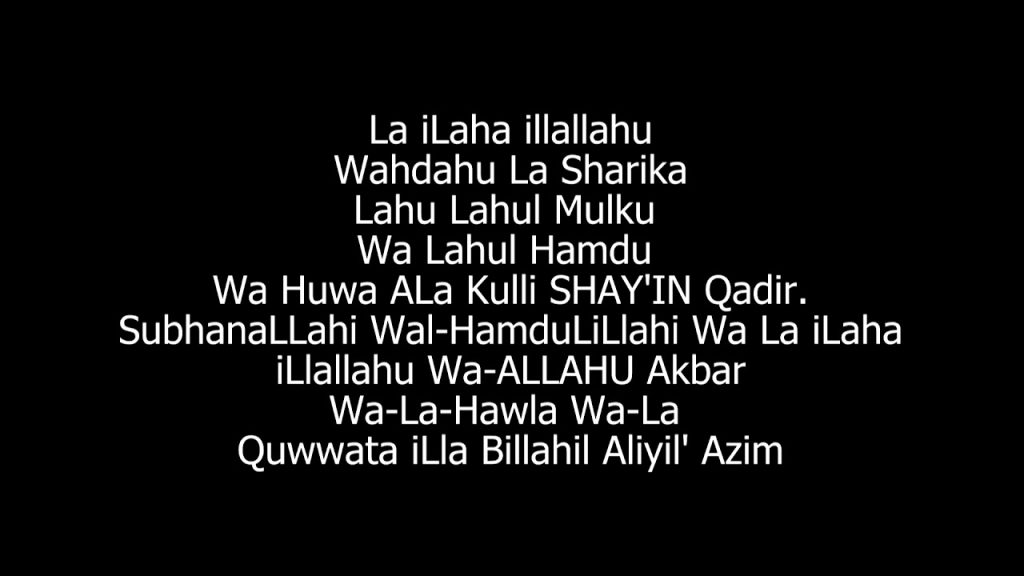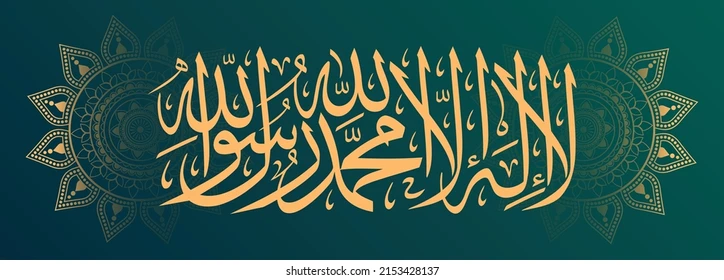The saying “La ilaha illallah in quran” is cardinal to Islamic theology, the fundamental declaration of faith in Islam, literally meaning “There is no god but Allah.” This exact phrase does not occur in this particular wording anywhere in the Quran, though its essence and meaning are profoundly embedded throughout the text.

Surah Al-Baqarah (2:163):
وَإِلَٰهُكُمْ إِلَٰهٌ وَاحِدٌ ۖ لَّا إِلَٰهَ إِلَّا هُوَ الرَّحْمَٰنُ الرَّحِيمُ
Surah Al-Ankabut (29:46):
وَلَا تُجَادِلُوا أَهْلَ الْكِتَابِ إِلَّا بِالَّتِي هِيَ أَحْسَنُ إِلَّا الَّذِينَ ظَلَمُوا مِنْهُمْ ۖ وَقُولُوا آمَنَّا بِالَّذِي أُنزِلَ إِلَيْنَا وَأُنزِلَ إِلَيْكُمْ وَإِلَٰهُنَا وَإِلَٰهُكُمْ وَاحِدٌ وَنَحْنُ لَهُ مُسْلِمُونَ
Surah Muhammad (47:19):
فَاعْلَمْ أَنَّهُ لَا إِلَٰهَ إِلَّا اللَّهُ وَاسْتَغْفِرْ لِذَنبِكَ وَلِلْمُؤْمِنِينَ وَالْمُؤْمِنَاتِ ۗ وَاللَّهُ يَعْلَمُ مُتَقَلَّبَكُمْ وَمَثْوَاكُمْ
Surah Muhammad (47:19):
فَاعْلَمْ أَنَّهُ لَا إِلَٰهَ إِلَّا اللَّهُ وَاسْتَغْفِرْ لِذَنبِكَ وَلِلْمُؤْمِنِينَ وَالْمُؤْمِنَاتِ ۗ وَاللَّهُ يَعْلَمُ مُتَقَلَّبَكُمْ وَمَثْوَاكُمْ
Surah Al-Ikhlas (112:1-4):
قُلْ هُوَ اللَّهُ أَحَدٌ * اللَّهُ الصَّمَدُ * لَمْ يَلِدْ وَلَمْ يُولَدْ * وَلَمْ يَكُن لَّهُ كُفُوًا أَحَدٌ
These are the verses where the phrase “La ilaha illallah” appears in the Quran along with their respective Arabic texts.
Occurrence and Context
Similar Expressions in the Quran:
Indeed, the Quran impresses monotheism, and such a theme is iterated in numerous statements, drawing attention to the core meaning represented by “La ilaha illallah.” Some of them are as follows:
Surah Muhammad (47:19): “So know [O Muhammad] , that there is no deity except Allah…”
Surah Al-Baqarah (2:163): “And your god is one God. There is no deity [worthy of worship] except Him…”
Surah Al-Ikhlas (112:1): “Say, ‘He is Allah, [who is] One.’
While the exact phrase “la ilaha illallah” does not occur verbatim in the Quran, the message of monotheism is constantly repeated. Allah is the sole god to be found, and He alone is to be worshipped and adored. The thematic significance is overwhelming within the Quran, the major theme that is repeated probably more than two hundred times in all its forms.

· The declaration “La ilaha illallah” forms the bedrock of Islamic faith. It comprises the first part of the Shahada, or Testimony of Faith, the profession of which is necessary for entry into the faith of Islam. Repetitive emphasis by the Quran on monotheism underscores its being the prime tenet of Islam.
Islam, like all genuine religions before it, preached the message of monotheism. The Quran, therefore, narrates the messages of numerous prophets from Adam, Noah, Abraham, Moses, and Jesus, who all called people to worship one God. This universal message can therefore be traced in “La ilaha illallah.”
“Inna Lillahi Wa Inna Ilayhi Rajioon” is not read at the time of the death of some person. The Prophet, on him be peace, used to read it whenever he suffered from some hardship. Happily,
One should offer words of comfort to the deceased’s family: “May Allah have mercy and be kind to the departed soul! And may He forgive all their mistakes! And may He give all of you endurance and a good recompense in this calamity.” If one utters “Inna lillahi wa inna ilayhi raji’un” (إِنَّا ِل’l(!$ Lafو inna إِلَيْهِ رَاجِعُونَ) out of haste, it is permitted in this case.
In Hardship:
On saying ” Inna lillahi wa inallah-e-raji’oon” (إِنَّا ِلِلَّٰهِ وَإِنَّا إِلَيْهِ رَاجِعُونَ),
Sayyiduna Husayn ibn Ali RA reported that the Holy Prophet SAW said, “When a Muslim man or woman is afflicted by an issue and then thinks about the issue even after a very long time and says, ‘We belong to Allah, and to Him is our return,’ then Allah, Blessed and Exalted, revives the same reward for him whenever it is said, equivalent to the reward given on the day of afflicting the issue.” (Mishkat 1759)
This is a reminder for mankind of his subordination to the will of Allah and that these worldly afflictions are transitory.
Theological Implications
Tawhid (Oneness of God): The backbone of every Islamic theology is its root word, Tawhid. In simple terms, Tawhid means to recognize and affirm the oneness, uniqueness, and sovereignty of Allah. It disowns every form of polytheism, idolatry, or associating anybody with Allah.
Worship and Obedience:
Belief in “La ilaha illallah” signifies the worship of Allah, the belief that He is to be worshipped alone, without associating any belief with Him at all, and the belief that in all aspects of life, one is willing to submit unconditionally, without any reservation, to His command. Time and again, the Quran repeats the message that ‘Ibadah of Allah Alone’ and obedience to His guidance are the prerequisites for spiritual success and salvation.
Quranic Reinforcement
Admonition Against Shirk (Polytheism):
There are hundreds of warnings in the Holy Quran against shirk. These warnings strengthen the message of “La ilaha illallah” by showing the terrible consequences of rejecting this supreme truth. For example:
Surah An-Nisa (4:48): “Indeed, Allah does not forgive association with Him, but He forgives what is less than that for whom He wills. And he who associates others with Allah has certainly fabricated a tremendous sin.”
The Characteristics of Allah:
The Quran speaks of the attributes of Allah many times for the eminence and uniqueness of Him. Ayat-ul-Kursi itself has the explanation of an attribute of Allah. And further on in Surah Al-Hashr 59:22-24, it speaks that there is only one to be worshiped, which is Allah.
The Muslims recite “La ilaha illallah” repeatedly in their daily prayers and other acts of worship. As such, the declaration, in the ritual/acts of worship, remains to bring the consciousness and thus reinforce the significance of the declaration into the heart and mind of the believer.
Social and Moral Behavior:
“La ilaha illallah” forms a believer’s perspective towards life and carves out his/her ethical behavior. It draws a sense of responsibility, as one is well aware that all deeds are, in the final analysis, being done for Allah, and Allah alone is the judge of all. This belief shapes personal integrity, social justice, and compliance with moral values.
Components in Quran
“La ilaha illa Hu” (لَا إِلٰهَ إِلَّا هُوَ) – “There is no deity except Him”:
It can be found repeated on a number of occasions in the Quran for the purpose of emphasizing the oneness of Allah.
Some examples: Surah Al-Baqarah (2:255), Surah Al-Imran (3:2), and Surah Ta-Ha (20:8).
“La ilaha illa Allah” (): “There is no deity except Allah”:
“It occurs frequently in that form, as in Sur.
“Inna Lillahi Wa Inna Ilayhi Rajioon” The meaning of this line in Islam is immense, as it is a verse from the Quran, number 2:156, that has to be read in the wake of all misfortune or adversity. That is, we are for Allah, and to Him we return. Alternatives:
They are those upon whom descend blessings from their Lord and His mercy, and it is they who are the guided ones.
It is not just a saying when we say, “Inna Lillahi Wa Inna Ilayhi Rajioon”; the feeling inside the heart is profusely sincere and full of belief. Actually, we are in a process to return things to Allah and admit that it is with Allah. So, sincerely, whatever is sacrificed for the sake of Allah truly serves its cause and comes to its ultimate destination.
There are several ahadith that refer to reading this addition, especially during calamity, “Innam Lillahi Wa Inna Ilayhi Rajioon.” Rasool Allah urged them to read these verses during misfortunes so that they might seek the reward in Allah and a better recompense.
The sentence “La ilaha illallah” is fundamental to the creed of Islam, literally meaning “There is no god but Allah.” However, this phrase nowhere actually occurs in the Quran. What repeatedly does appear in the Quran is an affirmation of monotheism and Allah’s unity, variously expressed at different times and in different ways through a number of forms of phrases.
Expressions of Monotheism La Ilaha Illallah in Quran
- “La ilaha illa Huwa” (لَا إِلَٰهَ إِلَّا هُوَ): The sentence “There is no deity except Him” is reiterated many times in the Quran to emphasize the singularity and uniqueness of Allah. This occurs about 30 times in different verses, thus:
- Surah Al-Baqarah (2:255): “Allah! There is no deity except Him, the Ever-Living, the Sustainer of existence.”
- Surah Al-Imran (3:2): “Allah! There is no deity except Him, the Ever-Living, the Sustainer of existence.”
- “La ilaha illa Ana” (لَا إِلَٰهَ إِلَّا أَنَا): It means, “There is no deity except Me,” and this expression occurs in those verses where Allah is directly addressing the people. For example:
- Surah Taha (20:14): “Indeed, I am Allah. There is no deity except Me, so worship Me and establish prayer for My remembrance.”
Why the Exact Phrase “La ilaha illallah in quran” Isn’t in the Quran:
The exact phrase “La ilaha illallah” does not appear anywhere in the Quran, despite the latter consisting of many ideas borrowed from several of its verses. Hence, it is a summary declaration of faith the Shahada used by every Muslim to express his belief in Allah’s unity and basic to Islamic theology.
Conclusion
The oneness of Allah is repeatedly emphasized in the Quran, different variations of the concept found in “La ilaha illallah.” One does not find the precise wording, but certainly the essence of this statement is peppered throughout the Quran to hammer home the central belief in monotheism within Islam.

AoA, my name is Abd al-Rahman, and my vision is to spread the knowledge of the Quran to everyone. I am proud and tall while standing as your trusted mentor on the journey of learning and memorizing the Holy Quran. I, along with a committed team of Islamic teachers, am bound to provide an easy online facility for Islamic studies and Hifz programs.

